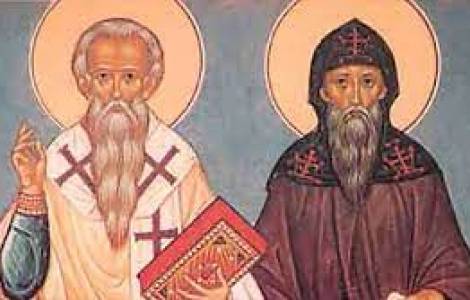
Rome (Agenzia Fides) - Christ's message of salvation can reach every people and every human being only if he speaks in his "mother tongue". Only in this way does the Christian faith show that it is not "foreign" to any people and to any human community, and the risk of preaching the Gospel in ‘an abstract, distilled way’, is avoided", said Pope Francis during the general audience today, Wednesday, October 25, continuing the series of catecheses dedicated to men and women who witnessed with intensity the passion for proclaiming the Gospel and apostolic zeal. To the multitude gathered in St. Peter's Square, the Bishop of Rome today reiterated the testimony of the missionary Saints Cyril and Methodius, known as "the Apostles of the Slavs", whom St. John Paul II proclaimed co-patrons of Europe and to whom he dedicated the 'Encyclical Slavorum Apostoli.
Born in Greece in the ninth century into an aristocratic family, they "renounced a political career to devote themselves to monastic life. But their dream of a secluded existence was short-lived", recalled the Pope.
They were sent as missionaries to Great Moravia, which at the time included various peoples, and where "their prince asked for a teacher to explain the Christian faith in their language". The two brothers, first of all, study the culture of those peoples. Cyril - the Pope recalled - "asked if they have an alphabet; they told him they did not. He replied: “Who can write a speech on water?”. Indeed," continued the Pontiff, "to proclaim the Gospel and to pray, one needed a proper, suitable, specific tool. So, he invented the Glagolitic alphabet. He translated the Bible and liturgical texts. People felt that the Christian faith was no longer ‘foreign’, but rather it became their faith, spoken in their mother tongue. Just think: two Greek monks giving an alphabet to the Slavs".
For the two "apostles of the Slavs", the difficulties came above all from within the Church, from the "Latins who saw themselves deprived of their monopoly on preaching to the Slavs. The fight within the Church", remarked the Pope "it is always that way". The objections to the apostolic work of Cyril and Methodius are disguised as 'religious' motivations: there are those who say that God can be praised - they said, only in the three languages written on the cross: Hebrew, Greek and Latin. Cyril – Pope Francis recalled –"responded forcefully: God wants every people to praise Him in their own language". Together with his brother Methodius, he finds support in the Church of Rome and in Pope Adrian II, who "approved their liturgical texts in the Slavic language, had them placed on the altar of the Church of Saint Mary Major, and sang with them the Lord’s praises according to those books".
Cyril died a few days later, and his relics are still venerated in Rome, in the Basilica of Saint Clement. Methodius, instead, was ordained a bishop and sent back to the Slav territories, where he "would suffer a great deal: he would even be imprisoned, but the Word of God", added the Successor of Peter, "was not shackled and spread throughout those peoples".
In the final part of the catechesis on Cyril and Methodius, Pope Francis underlined three "important aspects" of their witness, starting from the vocation to unity. "The Greeks, the Pope, the Slavs: at that time" recalled the Pontiff "there was an undivided Christianity in Europe, which collaborated in order to evangelize".
The second aspect highlighted by Pope Francis was "inculturation" the proclamation of the Gospel in the given context, because "the Gospel cannot be preached in an abstract, distilled way. The Gospel must be inculturated".
A final aspect is freedom. "Preaching", Pope Francis warned, "requires freedom, but freedom always needs courage; a person is free to the extent that they are courageous and do not let themselves be shackled by many things that take away their freedom".
After the catechesis, the Pope addressed his greetings to Italian-speaking faithful and pilgrims, Pope Francis repeated his appeal to stop the violence in the Middle East, called for the release of all hostages and encouraged the international community to seek and find paths to peace. The Pope encouraged the entry of humanitarian aid in Gaza, and recalled the Day of Fasting and Prayer on Friday, October 27, to implore peace in the world. (GV) (Agenzia Fides, 25/10/2023)